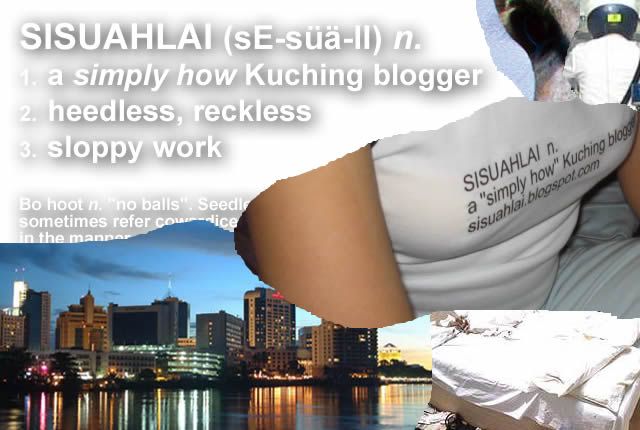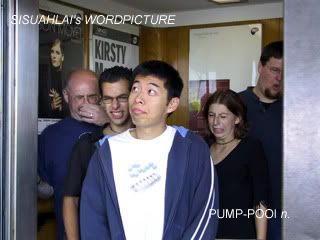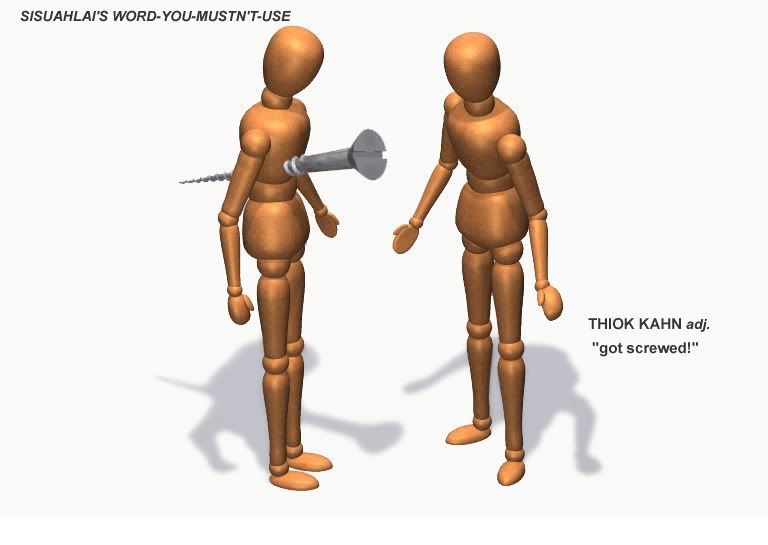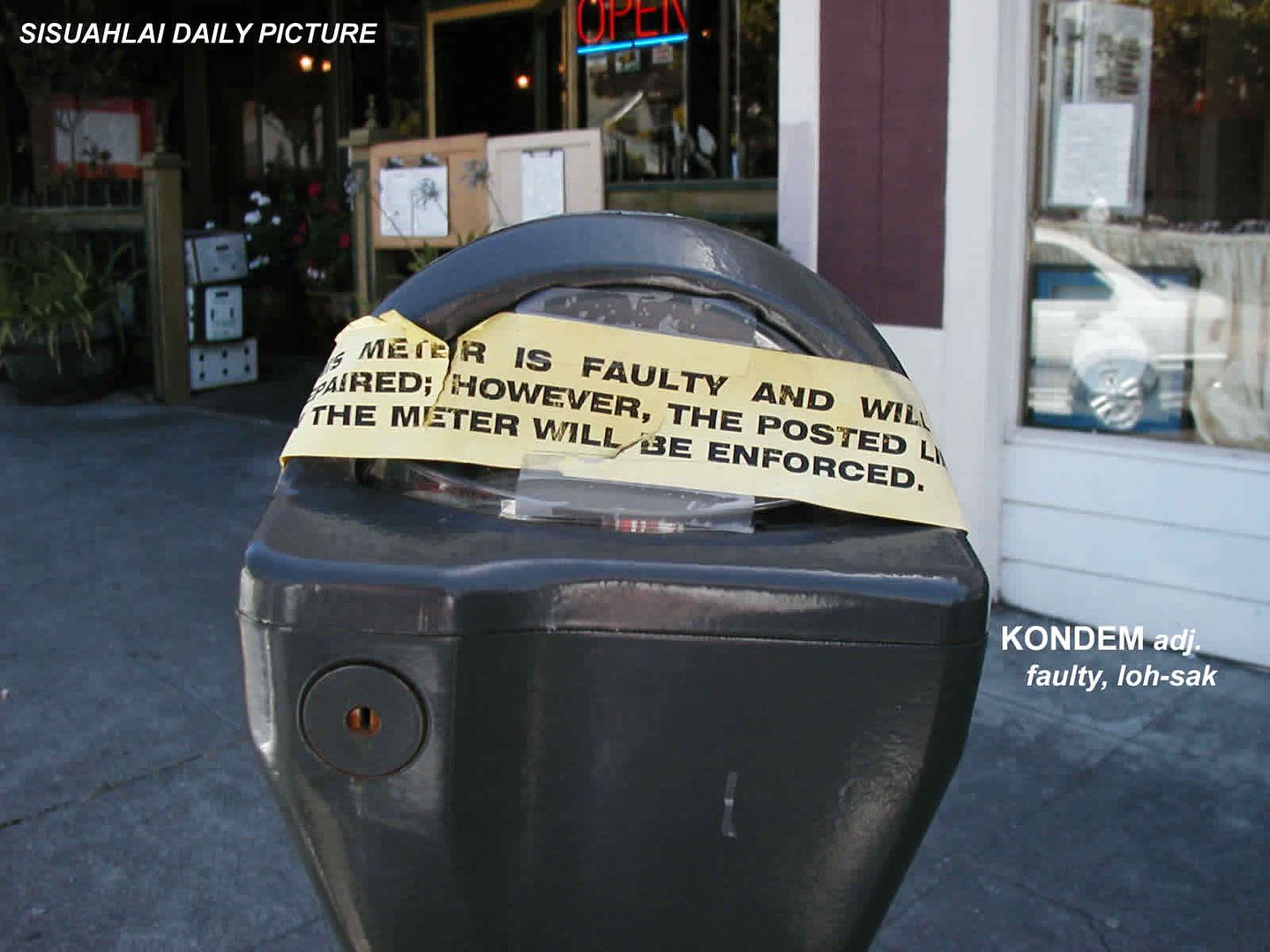Kau Pei Kau Bo
KAU v. to cry
PEI n. father
BO n. a Kuching Hokkien variation, correct pronounciation Bu (boo), which means Mother
Thank you Auntie for your request.
Kau pei kau bo. This phrase is used to describe the state of continuous wailing and discontentment. Literally, it means cry to father, cry to mother. It is typically used in the second person (the addressee) and third person (anyone other than speaker and addressee). Please do not use this phrase to describe yourself, like something I heard not long ago:-
Damn soo-ku (stupid)! I kau pei kau bo when my teacher took my handphone away.
Not only is the usage completely wrong, it actually makes the speaker appears really soo-ku. In fact, serve him right, I hope the teacher also takes his brain away.
Kau pei kau bo really means to create a cacophony, to nag, to badger, to lament on and on about foregone matters or incidents, often very trivial. It should not be used in a serious context.
Example of wrong application:
Ah-Chee: I cannot believe it! What! You didn't buy the winning 4D ticket?!
Ah-Meng: Ah-Chee, don't kau pei kau bo ok, nothing I can do now. So what if it was first prize. I really forget to buy your 4D numbers.
Strictly speaking, this is not a correct use of the phrase. Why? Because it is not a foregone matter, Ah-Meng now owes Ah-Chee the winning prize of 2 grand, because not buying 4D lottery tickets in Kuching when promised is actually punishable by law. Furthermore, this is indeed a serious matter, so the phrase should not be used.
Example of correct application:
Ah-Chee: What! Again! You forgot to buy the winning ticket for the second time this week!
Ah-Meng: Ah-Chee, please don't kau pei kau bo. Too late now.
Ah-Chee: I am so su-koo for asking you again.
Serve him right for entrusting Ah-Meng again. This is an acceptable use of the phrase as stupidity is in fact, a forgone matter. And also punishable by law in Kuching.
Sisuahlai. Never kau pei kau bo.
PEI n. father
BO n. a Kuching Hokkien variation, correct pronounciation Bu (boo), which means Mother
Thank you Auntie for your request.
Kau pei kau bo. This phrase is used to describe the state of continuous wailing and discontentment. Literally, it means cry to father, cry to mother. It is typically used in the second person (the addressee) and third person (anyone other than speaker and addressee). Please do not use this phrase to describe yourself, like something I heard not long ago:-
Damn soo-ku (stupid)! I kau pei kau bo when my teacher took my handphone away.
Not only is the usage completely wrong, it actually makes the speaker appears really soo-ku. In fact, serve him right, I hope the teacher also takes his brain away.
Kau pei kau bo really means to create a cacophony, to nag, to badger, to lament on and on about foregone matters or incidents, often very trivial. It should not be used in a serious context.
Example of wrong application:
Ah-Chee: I cannot believe it! What! You didn't buy the winning 4D ticket?!
Ah-Meng: Ah-Chee, don't kau pei kau bo ok, nothing I can do now. So what if it was first prize. I really forget to buy your 4D numbers.
Strictly speaking, this is not a correct use of the phrase. Why? Because it is not a foregone matter, Ah-Meng now owes Ah-Chee the winning prize of 2 grand, because not buying 4D lottery tickets in Kuching when promised is actually punishable by law. Furthermore, this is indeed a serious matter, so the phrase should not be used.
Example of correct application:
Ah-Chee: What! Again! You forgot to buy the winning ticket for the second time this week!
Ah-Meng: Ah-Chee, please don't kau pei kau bo. Too late now.
Ah-Chee: I am so su-koo for asking you again.
Serve him right for entrusting Ah-Meng again. This is an acceptable use of the phrase as stupidity is in fact, a forgone matter. And also punishable by law in Kuching.
Sisuahlai. Never kau pei kau bo.





 Your Chance to be (in)Famous!
If you want your photo (or any picture) to feature on Sisuahlai, please send it to
Your Chance to be (in)Famous!
If you want your photo (or any picture) to feature on Sisuahlai, please send it to
0 Comments:
Post a Comment
<< Home